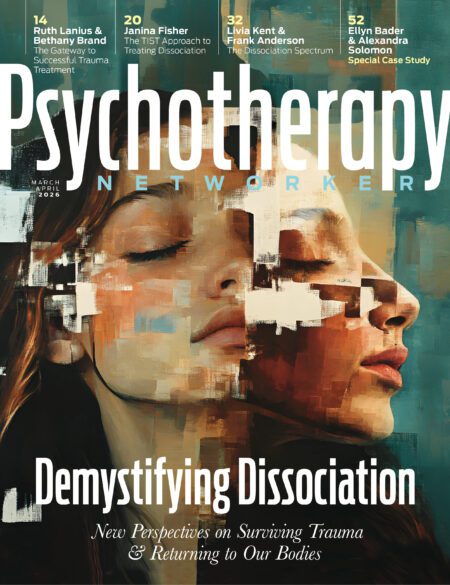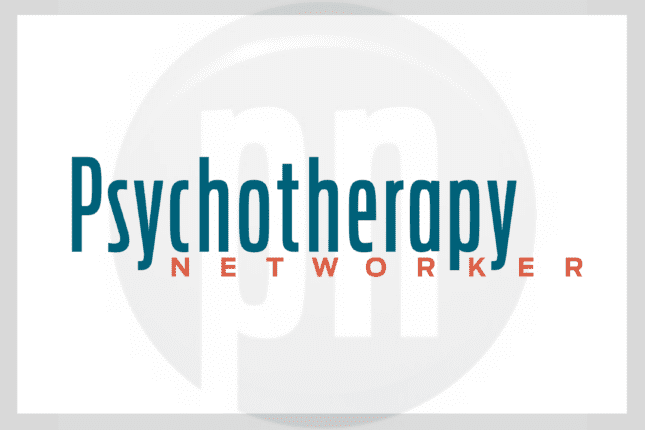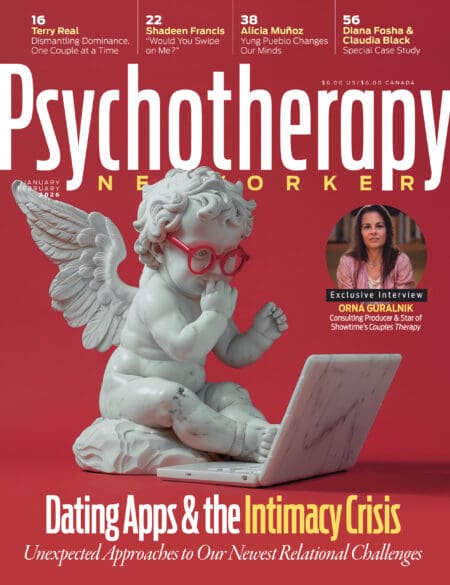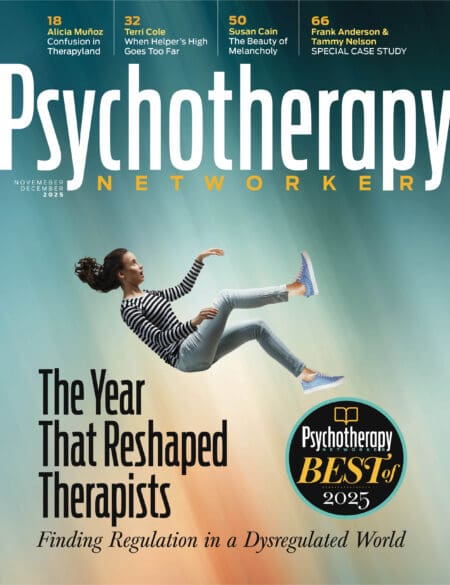Enjoy the audio preview version of this article—perfect for listening on the go.
By now, research has demonstrated that people by and large feel helped by psychotherapy. And even more than that, it’s a real bargain: the amount of change you get for the cost of the services is out of proportion to most other kinds of professional services, be it lawyers or physicians or a masseuse. So there’s a lot right with psychotherapy that we should embrace, even trumpet.
But how can we improve what we do and the results we achieve? We first need to face up to our continuing identity confusion as a profession. Who exactly are we in the world, and what is it that we do? The fact is, as a field, we seem to shift our focus every few years and emphasize different ideas and theoretical perspectives. In the ’60s, we were all about behavior and strategy. Through the ’70s and ’80s, we zeroed in on cognitions and thoughts. Then in the ’90s, of course, we began the so-called decade of the brain. Now everywhere you look, we’re talking about bringing more mindfulness into therapy. But we lack a consistent identity or message to the public about what we can offer people.
We might actually learn a thing or two about public relations from Big Pharma. Much of its success reflects the fact that it didn’t just sell drugs: it sold an idea. Starting with the marketing of Prozac in the ’80s, it promoted the idea that depression was a biochemical illness. Forget that there was never any evidence for this notion. Consumers, and dare I say a fair number of therapists, bought the idea that what was troubling people was the result of some chemical problem in their brains. In sharp contrast, despite all the empirical evidence of our effectiveness, we’ve failed miserably to sell people the truth: psychotherapy has been proven to help people live healthier, happier lives, all without frightening side effects, such as dry mouth, erectile dysfunction, kidney failure, and death.
Part of the problem has been our own continuing lack of public clarity over what makes psychotherapy work. I think our recent fascination with neurobiology or mindfulness or this or that technique amount to running away from what’s actually responsible for the central efficacy of our work: the therapeutic relationship. Somehow, PET scans and new clinical techniques get attention, while decades of data show that neither contributes much, if anything, to the overall effectiveness of psychotherapy.
On a related note, I find it strange that whenever one of us is interviewed in a public forum, most of the time is spent talking about the problems people have, rather than the strength of the solution we have to offer. We need to embrace what our research tells us: a professional relationship organized around empathy, genuineness, respect, openness, congruence, collaboration, and goal consensus helps people change. And these are things we’re good at.
How can we get even better? The answer is really quite simple and straightforward: garner and use more client feedback. Evidence shows that we’re not particularly good at detecting which clients aren’t progressing or are actually getting worse. By monitoring our work and formally seeking and responding to client feedback regarding therapeutic progress and the quality of the relationship, outcomes improve and dropouts decline.
We need to augment our intuition with a systematic metric to measure the progress of therapy. We live in a highly technical world, where clients can check every aspect about us in an instant. Accurately and reliably measuring our own work, in turn, allows us to communicate more accurately who we are and what we have to offer. This is something that almost every successful business does: constantly seek feedback from consumers, try to aggregate and understand it, and make changes accordingly.
Here’s another finding from research about us therapists: we want to see ourselves as developing professionally over the course of our careers. Of course, we want to get better at what we do! And yet available evidence indicates that we don’t, not with time and experience alone. Although we may like to see ourselves as becoming wiser and better as we age, that wisdom doesn’t translate into better outcomes, which is what our clients want. Continuing education workshops won’t enhance your craft. Rather, to get better, you have to identify your specific errors in clinical practice—not his or hers, but yours—the times when you failed to engage the person you were working with.
It comes down to paying attention to the relationship qualities mentioned above. You have to identify when you uniquely failed to do that and then develop a plan for how you’re going to address it next time. This means not learning some fancy new technique, but going back to the basics of therapeutic communication. Research shows that most errors that lead to clients’ disengagement and dropout are a result of their experiencing the therapeutic interaction as not empathic, not consistent with their values and preferences, and not addressing what they want.
What we’re learning is that the better therapists are, the more time they spend outside of work engaged in activities specifically designed to address their errors—what we call reflective or deliberate practice. If you want to be average or below average, it’s fine to leave your job at work, but top performers don’t do that: they read, they consult with peers, they get consultation, they plan. There’s no magic to it. They just simply do it more than the rest of us.
Scott Miller
Scott D. Miller, PhD, is the founder of the International Center for Clinical Excellence an international consortium of clinicians, researchers, and educators dedicated to promoting excellence in behavioral health services. Dr. Miller conducts workshops and training in the United States and abroad, helping hundreds of agencies and organizations, both public and private, to achieve superior results. He is one of a handful of “invited faculty” whose work, thinking, and research is featured at the prestigious “Evolution of Psychotherapy Conference.” His humorous and engaging presentation style and command of the research literature consistently inspires practitioners, administrators, and policy makers to make effective changes in service delivery. Learn more at scottdmiller.com.













